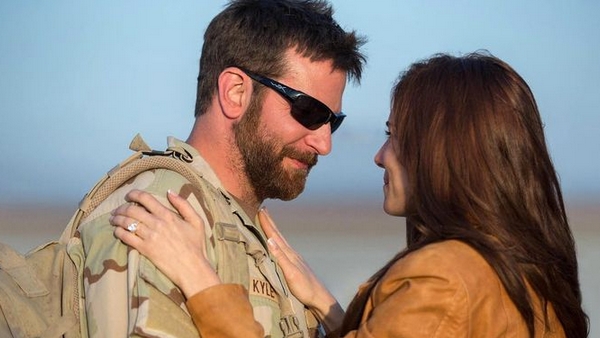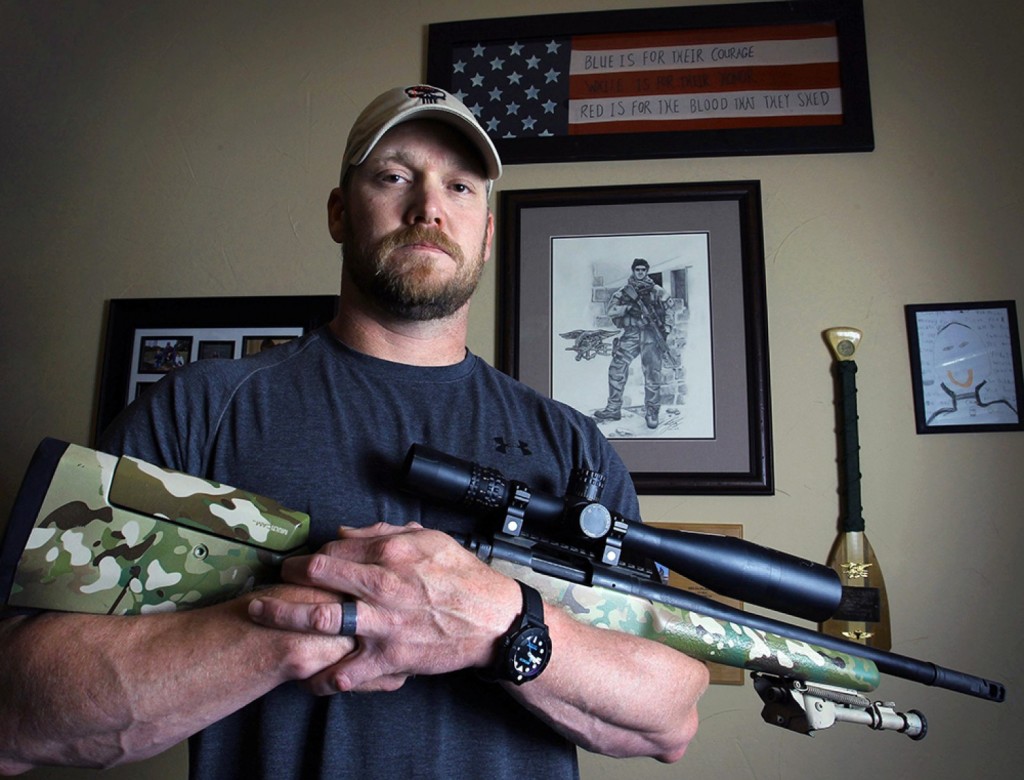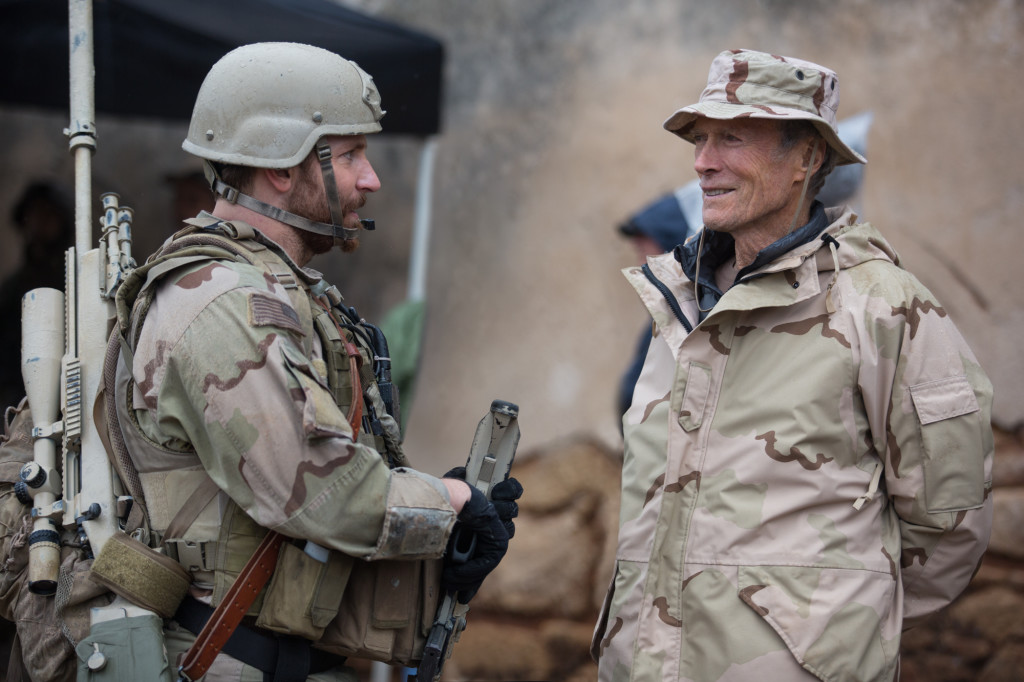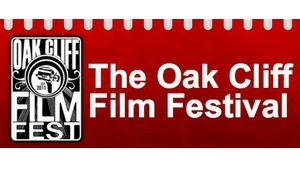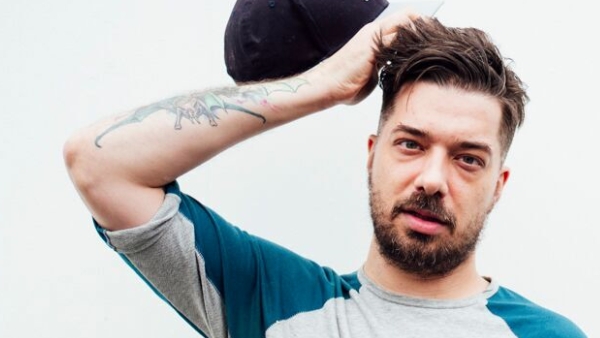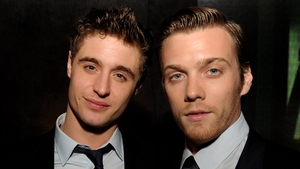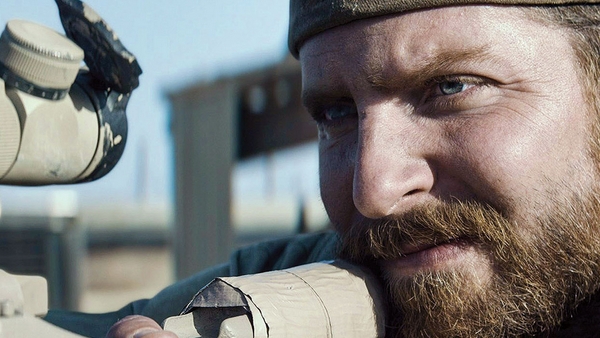 Following the premiere of American Sniper (Clint Eastwood’s biographical film about Chris Kyle from the novel of the same name) last Monday, we spoke with screenwriter Jason Hall about his efforts bringing this story to the big screen. However because of Klyle’s untimely death during the writing process, that tragic event turned the production into an entirely different film.
Following the premiere of American Sniper (Clint Eastwood’s biographical film about Chris Kyle from the novel of the same name) last Monday, we spoke with screenwriter Jason Hall about his efforts bringing this story to the big screen. However because of Klyle’s untimely death during the writing process, that tragic event turned the production into an entirely different film.
There’s always the intention to do right by any subject in a film like this, and Jason views the entire process not only as an obligation, but a privilege. Having met Chris before he ever wrote American Sniper, Jason got a first hand account of Chris’ life from Chris himself as well as his wife. The Eastwood directed film is an entirely honest account of the sacrifices in the Kyle family.
Yet the film is bigger than one man. It’s a statement about war, our nation, and how soldiers who are willing to die for their country don’t easily come back to what they left behind. It’s not just a re-adjustment process, their lives are altered forever, and some never really come back. Jason was entirely candid about the story, his process and the firsthand exchanges he had with Chris about his experiences.
GoSeeTalk: The story is as gripping as it is emotional. It’s exceptional really, and even more so, as they say, because it’s true. This is a big undertaking, so what made you want to tell Chris’ story and how did you get involved with the film?
Jason Hall: I heard about Chris’ story back in 2010 – that he is the most lethal sniper in U.S. military history – and I heard about his
2,100 yard shot. It sounded phenomenal and almost unreal. I come from a military family and I knew their war stories and they weren’t quite like this one. So I called a guy who I had done some research with on a prior project. He’s a SEAL 6 member, and a NOC (non official cover) guy who was working at the CIA when I called. I asked about Chris, and about his famous shot. Well my guy tells me right up front that “Your buddy is a liar. There’s only five guys in the world that can make that shot, and he’s not one of them”. So I said, “OK, well could you look up his name?”. He agreed and said “Yeah I’ll look it up right now, but I’m telling you, this guy is full of shit”.
So I’m waiting for this guy to call me, and when he did, he says “Here’s the deal, your guy is one of the five. I don’t know who this guy is, but whatever he did, he always seems to be at the right place, at the right time, to take the shot to save people’s lives and make the mission succeed”. He wasn’t at liberty to talk about all those things, but ultimately he said this guy is the real deal.
Let’s talk about your research. You got to meet with Chris before he had even written his book.
Oh yeah, I went to Texas to meet with Chris not knowing what I’d find. When I got there, I found a guy who looked like he had been through war and looked like he wasn’t totally back. You could look in his eyes and see there was a lot going on. There
was a lot of turmoil and darkness, and this guy had paid dearly for the things he had accomplished and that had been done to him. I didn’t know what the story was until I saw his wife and kids walk in the room the next day. They were excited to see him, and he struggled to get down to hug them.
He’s 37 years old and he can barely get down to his knees. It seemed like you were watching a 50 year old man get down on his knees. He spread out his arms to open up to his kids and his eyes lit up in a way that I had not seen when I first met him in the previous 24 hours. I realized that this guy was somebody else before all this, and that there is somebody else here now.
I watched his wife standing there, and I watched the look between them, and I took it that their marriage was still kind of reeling from the effects of the war. But I realized that whatever this guy had been through, she had been there right alongside him while she raised these two kids.
What I found compelling about this war was that it was, for us, really far away, and there was a lot of judgement about it after a certain amount of time. You see the ticker on the news channels that give nothing but the fatalities. So it felt far away for me, and yet to these families, for the first time in history, it was not far away. They were closer to the war than ever before because of technology, especially these special forces guys who had sat phones. This war was in the palm of this woman’s hand because he’d call her all the time.
I found that absolutely compelling, the fact that she was exposed to the war. She heard gun fire, and so did a lot of these wives, and so that was a story I had never seen before.
Getting Chris’ story told with integrity must have been very important as opposed to blindly trying to translate material from the book to the screen. How open was he? Also, coming from a military family, were you more or less familiar with terms and the kind of stories Chris had lived through?
My grandfather served in World War II and he had since passed, my uncle went to Vietnam but didn’t talk about it much, and my brother, who lost a hip in the Gulf War, didn’t have a lot of options going in and he had fewer when he got back. I knew these war stories, but it’s another language that these guys speak and I had to learn that.
But I had the benefit of working with Chris and he was very receptive. I left after about three days of meeting with him and he told me that he was going to write a book, which he did pretty quickly and we managed to get the rights to it easily because, really, nobody else wanted it.
Really? Why was that?
Well, in the book, Chris sounds like a guy who has a chip on his shoulder, and I don’t think people knew what to make of that. I, of course,
knew there was another guy there. They marketed to that voice in the book because they knew who was going to buy it, and they were right to do that and it flew off the shelves. But I wanted to tell the other side of the story about this guy who I met, and do my best to reveal the authenticity of this soldier’s life, and the soldier’s wife.
Chris and I had a lot of conversations – we would text, we would talk on the phone, I would harass him, and cajole him and do just about everything I possibly could to find out stuff about this guy – and I found out a lot of details but I never totally got the answer of “who he was” and, emotionally, what he sacrificed. I turned in the first draft and the next day he was murdered.
It was traumatic, and when I got the call I just started crying. I knew the family, spent time with the kids, and I have their voices floating around inside my head. I lost a friend, but I also understand what this family lost, and it was all so unreal. For all he had been through to, so suddenly, be taken that way by someone in his own backyard was wrong.
I went to the funeral and I gave his wife my number and she called me about a week later. She told me “Look, if we’re going to do this, you’re going to do this right, because, for better or worse, this is how my kids are going to remember their father”. It was a huge responsibility that turned into a privilege, but what do you say to a woman whose husband was just murdered? So the only thing I knew how to say was, “Tell me about your husband. Tell me everything in detail”. I had a lot of questions, and some of them were sensitive, but she revealed a lot of memories and the love story she had with this man in a very personal and courageous way.
We went on this journey of grief and recovery, so we talked everyday for about 3 or 4 hours. She would call me in the middle of the night, she’d call in the morning, it ended up being a relationship that she relied upon because it was useful to her to work these things out and find a way to express it. She was presenting the ultimate legacy, and it was this beautiful symmetry that is difficult to articulate. But we became really close friends and we were able to fashion this character with her words and her memories. Most things that she said in the movie were actually things she said in real life, and because of that, I think a certain truth resonates through the movie to the people watching it; that’s a direct result of someone’s courage.
So she had more influence on the story than you ever expected. It really changed the shape of the film you were trying to make in the first place.
What I learned is that if you want to know about a man, you ask his wife. Women understand us better than we understand ourselves because there’s a masculine and feminine side to every man. She shared a lot of intimate stories about what Chris tried to do while he was home. He, in a way, healed himself by helping save other soldiers who had come back and were having a real tough time at it.
When you’re dealing with the family, as you said, it’s a responsibility as much as it is a privilege. It’s interesting to go from dealing directly with Chris to only his wife. You were making the connection between their story, the words in the book and ultimately the screen. Yet there’s a big gap in between. You have Clint Eastwood, you have you have the producers, etc. so what was that middle ground like between all the parties?
Everyone who came on to the film became invested. I was there working at ground zero on this project, communicating with Chris and working to get his story out there. But right alongside was Bradley Cooper. He had such dedication to get this right. He’s obviously a producer, as well as the star of the movie, but he went above that because, as we all recognized, there was a great obligation here.
Not only to Chris and his family and those kids, but to every guy who went over there and lost something. Every guy, in every family, has paid a lot and some have paid even more dearly than Chris. So some of them will recognize sacrifices that Chris made when they hear his story. That was the story we wanted to tell. Everyone involved took that to heart and it shows up on the screen.
You said you were at the premiere on Monday. What was Chris’ wife’s reaction to it after seeing it completed?
You know, that’s a great question. I didn’t have the guts to watch it with her, but she stumbled out of the darkness after the credits rolled and she was crying. We have become really good friends, and I gave her a big hug and as she was on my shoulder she said, “I don’t know how you did it, but you brought Chris back to life. You all just gave me two hours with my husband”. It was a very powerful moment, and, for me, it was the pinnacle of the entire process. Whatever we have gone through, or what we will go through from here on in, I believe we reached the goal we set out to achieve. We did this for his wife, and his children, but the hope is that this story about one man resonates. We want it to become a story about all soldiers that expands our understanding of what they endure and sacrifice.
Unfortunately, we send these guys off and we train them to fight, but we don’t train them to come home and find peace. It’s a big problem with this country and something we have to work out because we send two million guys away to the war. 80% of them come home without a job, 40% of them come back without a place to live. 50% of the guys who need help don’t get it, and we don’t have a system for the guys who need it.
It’s a real issue, and I hope that Chris’ story resonates with these soldiers because we hear all about it from fathers and wives and uncles and cousins who come up and show the pictures of someone they know who is serving. They tell us that they understand this person
better now because that person doesn’t talk about it, but they understand what they’re going through in a way that they didn’t before. To me, that’s such a huge blessing. If we can shine a light on this in any way, shape or form, these guys deserve to be understood and it’s a big deal what they sacrifice.
As a country, we are Chris Kyle, we feel the need to protect the sheep against evil, and be the sheepdog. We’ve been on the wall for a long time, and this is the thing we’re bringing home. This kind of torment and unrest is something we have to deal with collectively and we either need to come off the wall, or find a way to deal with it.
You just touched on one of the three key terms in the film, ones that were very important in Chris’ young life. In the film, his father tells him and his brother about the sheep, the wolf and the sheepdog. Chris’ story is told with interweaving flashbacks so how does the screenplay help set the pace and outline for what’s on screen in American Sniper?
We pretty much told it how it was on the page. That was my intention. In retrospect, as a country, we look at the war in Iraq as a head-scratcher, or something that pissed us off, or something we simply endured. It’s just not a pleasant thing. It was regarded by most as a mistake, and some consider it unjust, and so to make a movie about that war, to the person that was there making the decisions that were much more dramatic and changed their lives, I wanted to present as clearly as possible that Chris was in a moral dilemma.
While we think there is no way that we can watch a movie about a guy who shoots a kid, that was the decision that these guys were forced to make. That was the difficulty in the decisions these soldiers made which altered their lives forever. But before we force the audience to make that decision, we have to understand who this guy is and what put him there in the first place. We have to understand why he made the decision to enlist, what put him there, and what he has to sacrifice. So we jump back in time to see his upbringing and how he grew up and who he was as a person, both as a boy and a man, showing what he has to lose, and then get back to that moment and challenge the audience not to take the shot because now we have a new understanding of who Chris is. We know everything he’s done, so when he does take that shot it’s a culmination of all those things, and rather than watching, we are experiencing it.
That’s the hope anyway, that we are experiencing it with him and we lose a little something as well. Chris was on four tours of duty, and it was important for me to explore not just the war life, but the home life. The paramount accomplishment of this guy who went back 4 times, for better or worse, was something I had to put in the movie. So it was about finding a thread to unify those four tours and give the film a backbone. That’s what we found with Mustafa, the enemy sniper who is Chris’ doppelganger, his mirror, and, in many ways, it is Chris himself.
That really relates to what Chris’ father was saying about protecting the sheep, but not becoming the wolf.
Exactly. It’s all about going after the wolf and in Chris’ case, as a sheepdog, when you hunt long enough, in certain cases, you become the hunter. Chris did. He crossed over into becoming that wolf. That’s the shot he takes at the end, and that’s what he has to find his way back from. So it was a very thoughtful process, going back to what you said about the screenplay when making the film and for the most part, we think it worked.
It did work, and the film was highly effective. But to close this out, because Clint Eastwood is such a big influence, what was your relationship with him, and what kind of back and forth did you have with him as a director?
Clint is fantastic! He’s able to tell things with such a musical cinematic flair, and what I mean by that is he has this jazzy sensibility and he expresses so much in every frame. He taught me to write to that a little bit and it’s not something I would call economy, but I would call it filmic musicality. It helped me find a way to get through some of this material by breezing through it rather than stepping through it. The film has to present so much truth, and Clint is so upfront and honest – he’s just so present that you’re almost forced to be in the present with him.
There’s so much truth about him, but it’s funny, he doesn’t force it or his opinion on you. It’s something that you can sense and you can find it, or not, but he almost makes you come after it. He makes you want to be part of something, and I think that’s why people like working with him. Now this film for instance, people might think “oh yeah it’s a Clint Eastwood movie, and there’ll be a lot of flag waving” or “this is from the guy who talks to a chair” and knock it, before seeing it, as some kind of jingoistic war movie, but I think they’ll be surprised because that’s not the movie represents.
Due to Chris’ death you dealt more with putting Chris’ wife in the film and making this more about family. It’s about the woman behind the man while we find out who Chris is. Exactly right, this is not a ‘might makes right‘ picture.
Right, and how can you honestly portray a real life soldier and make it a ra!, ra! war movie? You can’t because the reality of war is hellish. We explored that, but in addition to that, the reality of war is also human and the toll is man. That’s the sacrifice we make when we commit to go to war. We sacrifice these men and women, as well as their lives and their families. Yesterday I was there with the widow and two children who were left behind, and it’s very real to the people who are in the middle of it. This is their movie, and I hope they embrace it.
Thanks to Jason for his time. American Sniper stars Bradley Cooper and Sienna Miller and is directed by Clint Eastwood. The film will be in limited release starting Christmas Day, and Warner Bros. has set a wide release date early next year on January 16, 2015.
